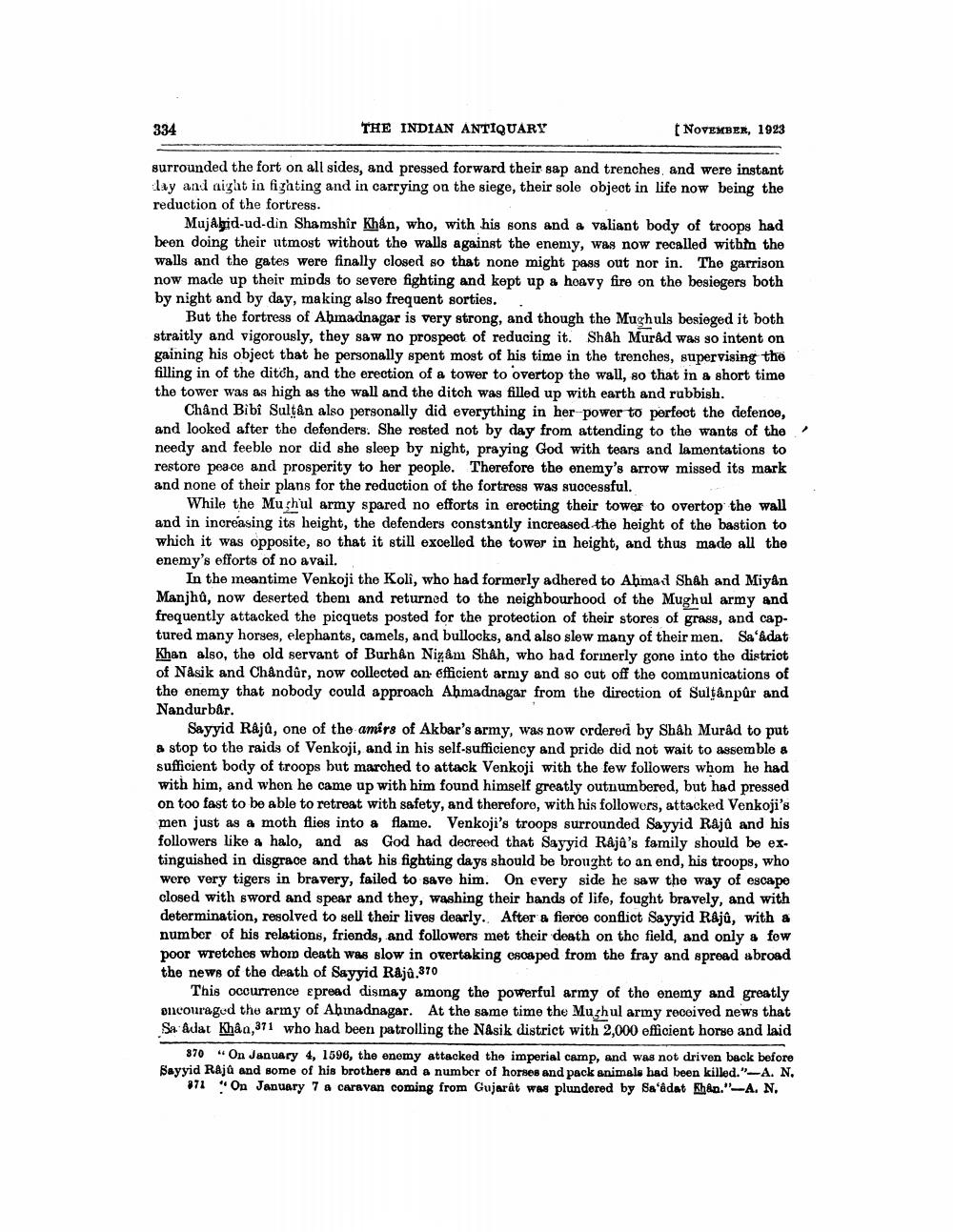________________
334
THE INDIAN ANTIQUARY
NOVEMBER, 1923
surrounded the fort on all sides, and pressed forward their sap and trenches, and were instant
lay and aight in fighting and in carrying on the siege, their sole object in life now being the reduction of the fortress.
Muj Abid-ud-din Shamshir Khan, who, with his sons and a valiant body of troops had been doing their utmost without the walls against the enemy, was now recalled within the walls and the gates were finally closed so that none might pass out nor in. The garrison now made up their minds to severe fighting and kept up a hoavy fire on the besiegers both by night and by day, making also frequent sorties.
But the fortress of Ahmadnagar is very strong, and though the Mughuls besieged it both straitly and vigorously, they saw no prospect of reducing it. Shah Murad was so intent on gaining his object that he personally spent most of his time in the trenches, supervising the filling in of the ditch, and the erection of a tower to overtop the wall, so that in a short time the tower was as high as the wall and the ditch was filled up with earth and rubbish.
Chånd Bibi Sultan also personally did everything in her power to perfect the diefence, and looked after the defenders. She rested not by day from attending to the wants of the needy and feeblo nor did she sleep by night, praying God with tears and lamentations to restore peace and prosperity to her people. Therefore the enemy's arrow missed its mark and none of their plans for the reduction of the fortress was successful.
While the Mughul army spared no efforts in erecting their tower to overtop the wall and in increasing its height, the defenders constantly increased the height of the bastion to which it was opposite, so that it still exoelled the tower in height, and thus made all the enemy's efforts of no avail.
In the meantime Venkoji the Koli, who had formerly adhered to Ahmad Shah and Miyan Manjhů, now deserted them and returned to the neighbourhood of the Mughul army and frequently attacked the picquets posted for the protection of their stores of grass, and captured many horses, elephants, camels, and bullocks, and also slow many of their men. Sa'adat Khan also, the old servant of Burhan Nizam Shah, who had forinerly gone into the distriot of Nasik and Chandûr, now collected an efficient army and so cut off the communications of the enemy that nobody could approach Ahmadnagar from the direction of Sultanpûr and Nandurbar.
Sayyid Raja, one of the amirs of Akbar's army, was now ordered by Shah Muråd to put & stop to the raids of Venkoji, and in his self-sufficiency and pride did not wait to assemble & sufficient body of troops but marched to attack Venkoji with the few followers whom he had with him, and whon he came up with him found himself greatly outnumbered, but had pressed on too fast to be able to retreat with safety, and therefore, with his followers, attacked Venkoji's men just as a moth flies into a flame. Venkoji's troops surrounded Sayyid Rajů and his followers like a halo, and as God had decreed that Sayyid Raja's family should be extinguished in disgrace and that his fighting days should be brought to an end, his troops, who were very tigers in bravery, failed to save him. On every side he saw the way of escape closed with sword and spear and they, washing their hands of life, fought bravely, and with determination, resolved to sell their lives dearly. After a fierce conflict Sayyid R&jû, with a number of his relations, friends, and followers met their death on tho field, and only & fow poor wretches whom death was slow in overtaking escaped from the fray and spread abroad the news of the death of Sayyid Råjû.370
This occurrence Epread dismay among the powerful army of the enemy and greatly encouraged the army of Abrnadnagar. At the same time the Mughul army received news that Sa Adat Khâu,371 who had been patrolling the Nasik district with 2,000 efficient horse and laid
870 "On January 4, 1690, the enemy attacked the imperial camp, and was not driven back before Bayyid Raja and some of his brothers and a number of horses and pack animals had been killed."-A. N.
871 On January 7 a caravan coming from Gujarût was plundered by Sa'adat Khan."-A. N.




